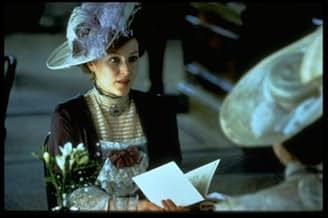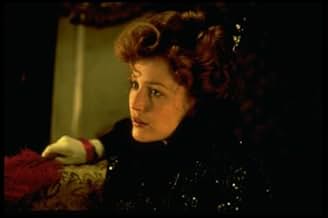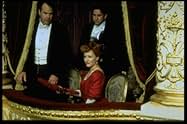IMDb RATING
7.0/10
8.4K
YOUR RATING
A woman risks losing her chance of happiness with the only man she has ever loved.A woman risks losing her chance of happiness with the only man she has ever loved.A woman risks losing her chance of happiness with the only man she has ever loved.
- Director
- Writers
- Stars
- Nominated for 2 BAFTA Awards
- 6 wins & 29 nominations total
Anthony LaPaglia
- Sim Rosedale
- (as Anthony Lapaglia)
Mary MacLeod
- Mrs. Haffen
- (as Mary Macleod)
- Director
- Writers
- All cast & crew
- Production, box office & more at IMDbPro
Featured reviews
Wow. Terence Davies' "House of Mirth" is a film that is just brilliant.
Essentially, the plot focuses on Lily Bart (Gillian Anderson) a socialite in the early 1900s in New York who, through a series of tragic circumstances, goes from being popular and admired to being a social outcast. Anderson is perfect in the role, and we feel all of her emotions. The superb cast includes Dan Aykroyd and Eric Stolz as two of her suitors, and Anthony LaPaglia, great as always, as a man who tries to help Lily out despite her pride winning over.
Davies' direction is incredible, one scene is simply of an empty house as it rains and it is just mind-blowing. The script, also, feels real all of the time which is a credit to the actors also.
I definitely recommend this movie, but don't expect it to zoom straight by and then be forgotten!
Essentially, the plot focuses on Lily Bart (Gillian Anderson) a socialite in the early 1900s in New York who, through a series of tragic circumstances, goes from being popular and admired to being a social outcast. Anderson is perfect in the role, and we feel all of her emotions. The superb cast includes Dan Aykroyd and Eric Stolz as two of her suitors, and Anthony LaPaglia, great as always, as a man who tries to help Lily out despite her pride winning over.
Davies' direction is incredible, one scene is simply of an empty house as it rains and it is just mind-blowing. The script, also, feels real all of the time which is a credit to the actors also.
I definitely recommend this movie, but don't expect it to zoom straight by and then be forgotten!
Director Terence Davies has done a magnificent job of recreating the turn of the century in "The House of Mirth," a 2000 film starring Gillian Anderson, Eric Stoltz, Dan Ackroyd, Laura Linney, Anthony LaPaglia, and Terry Kinney.
Anderson is Lily Bart, a beautiful young woman of good social standing, traveling in the best circles, who throws away her opportunities for a good marriage because she wants something more meaningful. However, her reputation begins to suffer due to her circle's misreading of an innocent situation, and things go from bad to worse for her as she descends down the social strata. She has it in her power to win back everything she has lost but refuses to stoop that low due to her love for one man.
It's obvious that Davies took a great deal of care with this film. It is not infused with modern sensibilities, the period look is authentic, as is the look of the cast. By that I mean, Gillian Anderson's sumptuous red hair, full beautiful face, and lovely figure are much more period than, say, Gwyneth Paltrow's -- and yet films are rarely cast with an eye toward capturing the period in that way. The casting of Dan Ackroyd as Trenor is unusual but very right - he's not truly of the class he travels in and a real glad-hander. Eric Stoltz is Selden - handsome without being drop dead gorgeous, gentile without being effeminate, who has good chemistry with Anderson.
The villainess of the piece is Laura Linney as the awful Bertha Dorset, a cunning witch, and as usual, Linney is perfection -- smiling, subtle, and you can just see the knife going in. In the book she is more responsible for Lily's troubles than in the film. In the film, we see her making initial trouble for Lily; in the book, she continues to work on destroying her with a whisper here and word there.
What makes the story of Lily so frustrating is that she can ruin Bertha in five minutes but refuses, suffering instead, which drove me crazy. That's not the film's fault.
This was an era where no one expressed emotions, so when someone says, thank you or I understand, there is a world of meaning to be read in the eyes. It's a world of artifice, and Davies obviously worked at getting this from his actors. Everything is in what lies beneath.
The acting is uniformly excellent; only Gillian Anderson falls a little short of the mark. Lily is an extremely difficult role, and Anderson at least in 2000 did not have all the necessary skill to completely pull it off. She has the look, the bearing, and the intelligence. What she lacks is the ability to actually become someone of that era, rather than putting it on like an overcoat. She does much better in the latter part of the film, which calls for a different set of acting muscles than in the beginning.
Reminiscent a bit of "Sister Carrie," "The House of Mirth" points up the difficulties of women in that time period to make their way, of the boundaries of class, and the rigidity of the upper class. Highly recommended, but not an easy, cheerful film by any means.
Anderson is Lily Bart, a beautiful young woman of good social standing, traveling in the best circles, who throws away her opportunities for a good marriage because she wants something more meaningful. However, her reputation begins to suffer due to her circle's misreading of an innocent situation, and things go from bad to worse for her as she descends down the social strata. She has it in her power to win back everything she has lost but refuses to stoop that low due to her love for one man.
It's obvious that Davies took a great deal of care with this film. It is not infused with modern sensibilities, the period look is authentic, as is the look of the cast. By that I mean, Gillian Anderson's sumptuous red hair, full beautiful face, and lovely figure are much more period than, say, Gwyneth Paltrow's -- and yet films are rarely cast with an eye toward capturing the period in that way. The casting of Dan Ackroyd as Trenor is unusual but very right - he's not truly of the class he travels in and a real glad-hander. Eric Stoltz is Selden - handsome without being drop dead gorgeous, gentile without being effeminate, who has good chemistry with Anderson.
The villainess of the piece is Laura Linney as the awful Bertha Dorset, a cunning witch, and as usual, Linney is perfection -- smiling, subtle, and you can just see the knife going in. In the book she is more responsible for Lily's troubles than in the film. In the film, we see her making initial trouble for Lily; in the book, she continues to work on destroying her with a whisper here and word there.
What makes the story of Lily so frustrating is that she can ruin Bertha in five minutes but refuses, suffering instead, which drove me crazy. That's not the film's fault.
This was an era where no one expressed emotions, so when someone says, thank you or I understand, there is a world of meaning to be read in the eyes. It's a world of artifice, and Davies obviously worked at getting this from his actors. Everything is in what lies beneath.
The acting is uniformly excellent; only Gillian Anderson falls a little short of the mark. Lily is an extremely difficult role, and Anderson at least in 2000 did not have all the necessary skill to completely pull it off. She has the look, the bearing, and the intelligence. What she lacks is the ability to actually become someone of that era, rather than putting it on like an overcoat. She does much better in the latter part of the film, which calls for a different set of acting muscles than in the beginning.
Reminiscent a bit of "Sister Carrie," "The House of Mirth" points up the difficulties of women in that time period to make their way, of the boundaries of class, and the rigidity of the upper class. Highly recommended, but not an easy, cheerful film by any means.
The book is a masterpiece and this adaptation is almost up to that level, just as richly told and emotional. It is not the kind of adaptation that will suck people in straightaway but the slow pace and how subtle a lot of aspects are actually add to the storytelling rather than distract and shouldn't be reasons to dismiss it. While I can understand completely why not everybody will like The House of Mirth some of how the detractors express their opinion reek of ignorance, like with the I'm-right-you're-wrong attitude. The House of Mirth does have a slow start and Eric Stoltz's performance can seem rather lightweight for such a complex character, though he is not without his affecting moments. The casting does have the "is this going to work" thought initially but the performances come across really well. Laura Linney sinks her teeth into her role and is suitably bitter, Eleanor Bron is formidable, Dan Aykroyd also comes across surprisingly well in a menacing and cunning turn and Jodhi May is charming and sympathetic. Terry Kinney, Anthony LaPaglia, Penny Downie and Elizabeth McGovern are also very good. The best of the lot is Gillian Anderson, whose performance is magnetic and truly heartfelt, her last scene with Stoltz is just heart-wrenching. The House of Mirth is shot very elegantly and the whole adaptation's period detail looks gorgeous. The lack of music is a good choice, allowing the intimate, understated atmosphere of the storytelling speak for itself. The dialogue is distinctively Edwardian and very literate without being stilted, how it's adapted is very thoughtfully done and any observations of the attitudes and classes of the time are sharply done. The story takes its time to unfold which is not a bad thing, period dramas often benefit from this especially when it's adapted from complex source material, and thankfully this deliberate pacing is not done in a self-indulgent way. Narratively The House of Mirth is incredibly touching and rich in theme and character, allowing you to identify with the characters(written and characterised believably) and with the interactions and the emotion it always maintained my interest. The direction is very intelligent and subtle. All in all, a truly beautiful adaptation. 9/10 Bethany Cox
I'm not sure how this movie could get a bad review. Of course, there are those people who find its pace too slow. However, one must realize that this is a period drama; it's not meant to be an action-packed suspense thriller. Everything is subtle, but it is so beautifully prepared, thought out, and executed by all.
1. Were it for nothing else, the technical aspects of this film would have kept me watching until the very end. The music was perfectly placed to rise and fall with the internal emotions of the characters - especially Lily and Lawrence - and to express the turmoil of the social downfall of Lily. On top of that, you have phenomenal costumes and set with the most lavish colors. Lastly, and possibly what I found most fascinating about the film, was the lighting. it always seemed just bright enough or just dark enough to reflect the romance or dreariness. In addition, there is just not denying that the way the light fell upon Gillian Anderson in every, single scene is something I have never seen before.
2. The all-star cast! Gillian Anderson. Eric Stolz. Laura Linney. Anthony LaPaglia. Dan Akroyd. Do I have to go on? I can almost guarantee that you'll find yourself, at one point or another, yelling at the screen. These characters are so manipulative and deceitful and malicious. And Lily is so naive and just won't accept love when it's given!! I think the best thing about the cast and performances in this film is that watching the film and listening to it are 2 completely opposite experiences. The actors convey one thing with their faces and another with their voices; it's pure talent. I was amazed.
3. If nothing else, this film should watched purely for Gillian Anderson. This project was so different than her 'X Files' persona - and such a success, at that. The way she uses her eyes to express 5 different emotions in a matter of seconds blew me away. Her acting and utter vulnerability was awe-inspiring.
1. Were it for nothing else, the technical aspects of this film would have kept me watching until the very end. The music was perfectly placed to rise and fall with the internal emotions of the characters - especially Lily and Lawrence - and to express the turmoil of the social downfall of Lily. On top of that, you have phenomenal costumes and set with the most lavish colors. Lastly, and possibly what I found most fascinating about the film, was the lighting. it always seemed just bright enough or just dark enough to reflect the romance or dreariness. In addition, there is just not denying that the way the light fell upon Gillian Anderson in every, single scene is something I have never seen before.
2. The all-star cast! Gillian Anderson. Eric Stolz. Laura Linney. Anthony LaPaglia. Dan Akroyd. Do I have to go on? I can almost guarantee that you'll find yourself, at one point or another, yelling at the screen. These characters are so manipulative and deceitful and malicious. And Lily is so naive and just won't accept love when it's given!! I think the best thing about the cast and performances in this film is that watching the film and listening to it are 2 completely opposite experiences. The actors convey one thing with their faces and another with their voices; it's pure talent. I was amazed.
3. If nothing else, this film should watched purely for Gillian Anderson. This project was so different than her 'X Files' persona - and such a success, at that. The way she uses her eyes to express 5 different emotions in a matter of seconds blew me away. Her acting and utter vulnerability was awe-inspiring.
This is a slow paced mesmerising film. If your only knowledge of Gillian Anderson is as Dana Scully in the X-Files then you are in for a big surprise. Firstly the lady can act, and secondly with great subtlety. If you have read the book then clearly the writer/director Terence Davies has taken a few liberties. But so much script has been lifted word for word from the novel that I think he can be forgiven any eccentricities. This is a story of manners in early twentieth century New York and environs. Everyone seems so decent and 'proper', but each plays their own manipulative game. No-one (with the exception of Sim Rosedale) tells the truth. As a morality tale it seems as relevant today as when Edith Wharton wrote it. Davies has succeeded in losing none of its mood or punch by transferring it to screen. Unfortunately I think this is a film that requires watching more than once as some explanatory scenes appear to have ended up on the cutting room floor. Generally the acting is excellent throughout though I felt that at times Davies's enthusiasm for detail hamstrung some actors where others appeared to have relished the close direction. This is a film to add to your personal collection.
Did you know
- TriviaEdith Wharton named the source novel after a passage from Ecclesiastes 7:4, "The heart of the wise is in the house of mourning; but the heart of fools is in the house of mirth."
- GoofsThe film, which takes place during 1905-07, depicts several characters attending a performance of the opera "Cosi fan tutte" -- but that opera was first performed in New York in 1922.
- Crazy creditsThanks to the staff of Kelvingrove Museum, the Lord Provost and staff at Glasgow City Chambers, residents of Kersland Street, all the staff at the Arthouse Hotel, Glasgow, and the Earls of Wemyss and March and Lady Wemyss.
- SoundtracksOboe Concerto in D Minor: Slow Movement
Composed by Alessandro Marcello
Performed by Ferenc Erkel Chamber Orchestra
Courtesy of Naxos Recordings
- How long is The House of Mirth?Powered by Alexa
Details
- Release date
- Countries of origin
- Languages
- Also known as
- La casa de la alegría
- Filming locations
- Production companies
- See more company credits at IMDbPro
Box office
- Budget
- $10,000,000 (estimated)
- Gross US & Canada
- $3,043,284
- Opening weekend US & Canada
- $48,770
- Dec 25, 2000
- Gross worldwide
- $5,164,404
- Runtime2 hours 15 minutes
- Color
- Sound mix
- Aspect ratio
- 2.35 : 1
Contribute to this page
Suggest an edit or add missing content

Top Gap
By what name was Chez les heureux du monde (2000) officially released in India in English?
Answer


































